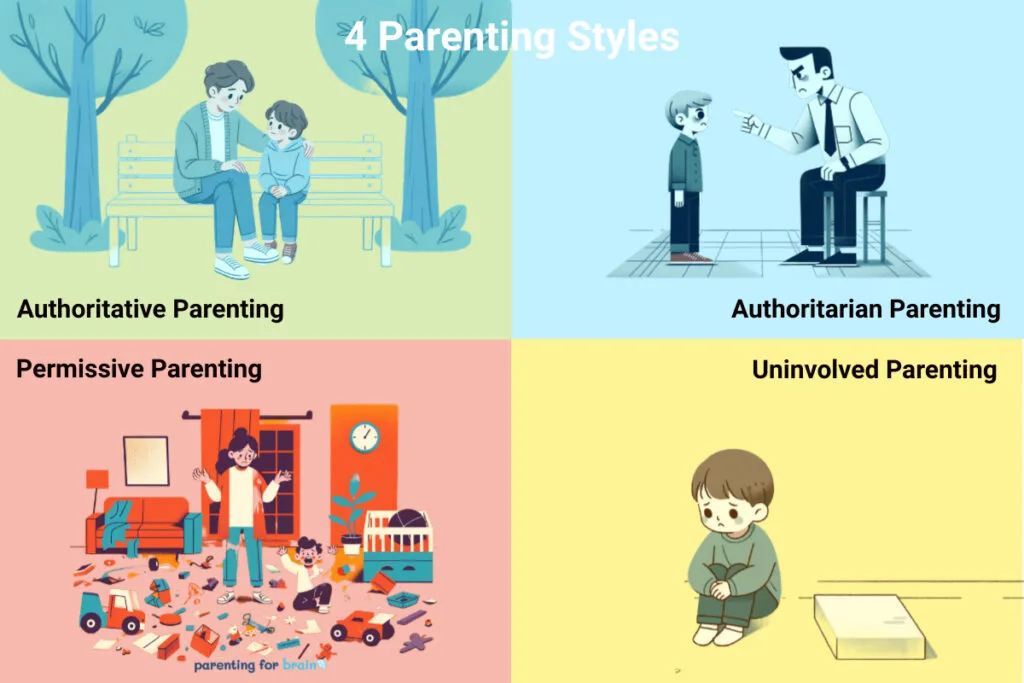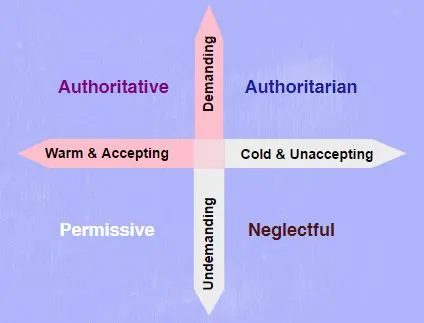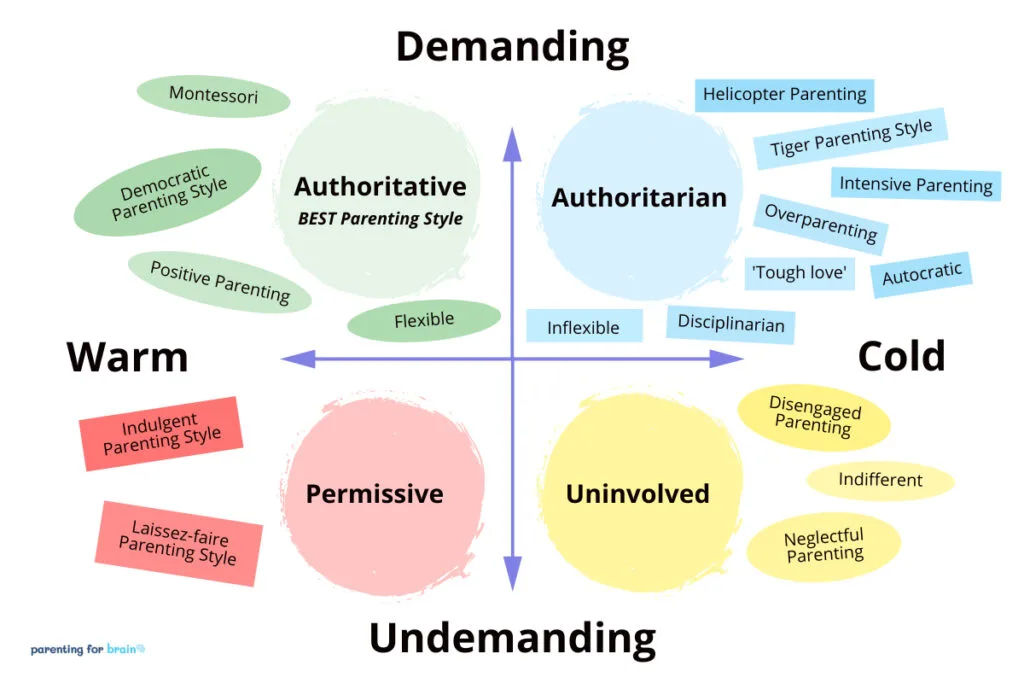The 4 types of parenting styles are authoritative, authoritarian, permissive, and neglectful parenting style. According to the American Academy of Pediatrics and psychologists worldwide, the authoritative parenting style is the best. The neglectful parenting style is linked to the worst outcomes in children.
A 2010 study in the United States surveying over ten thousand school-aged students found that authoritative parenting was the most popular style, followed by authoritarian parenting.
Choosing among different parenting styles is important because how parents interact with their children has a lifelong impact on children’s healthy growth, including emotional, physical, and behavioral development.

TABLE OF CONTENTS
- What are the 4 types of parenting styles?
- What is authoritative parenting?
- What is authoritarian parenting?
- What is permissive parenting?
- What is neglectful parenting?
- What are the differences in parenting styles?
- What are the statistics on parenting styles?
- What is the best parenting style?
- How do parenting styles affect child development?
- Are there other parenting styles?
- What are the types of bad parenting styles?
- Chart and Download
- References
What are the 4 types of parenting styles?
The 4 types of parenting styles are authoritative, authoritarian, permissive, and neglectful. Each parenting style involves different levels of responsiveness and demandingness.
- Authoritative parenting style: High in responsiveness and demandingness
- Authoritarian parenting style: Low in responsiveness but high in demandingness
- Permissive parenting style: High in responsiveness but low in demandingness
- Neglectful parenting style: Low in responsiveness and demandingness
Demandingness refers to behavioral control and maturity expectations, and responsiveness pertains to parents’ emotional sensitivity.

What is a parenting style?
A parenting style is a set of child-rearing practices. Psychologists widely use the four parenting styles to understand the link between parenting methods and children’s development and behavior. These Baumrind parenting styles were based on research by developmental psychologist Diana Baumrind at the University of California at Berkeley and the work of Eleanor Maccoby and John Martin at Stanford University.1
In 1967, Diana Baumrind identified three parenting styles, namely authoritative, authoritarian, and permissive, and added a fourth style, negligent, in 1971. In 1983, Maccoby and Martin suggested a conceptual structure to combine different levels of parental demandingness and warmth to categorize the four parenting styles: authoritative, authoritarian, permissive, and neglectful.2,3
Authoritative parenting is warm and nurturing while maintaining high expectations and standards. According to Diana Baumrind’s theory, authoritative parenting encourages children to be independent but still places limits and controls on their actions.
Authoritative parents are firm, assertive, and consistent. They are not harsh, rigid, punitive, or restrictive. Authoritative parents give their children firm limits but try to explain their actions to teach children values, morals, and goals. They use positive parenting strategies to teach critical thinking and reinforce positive, responsible behavior. Authoritative parents care about their children’s well-being and respect their autonomy. Parents and children tend to develop close and healthy relationships.
The authoritative style is also called the democratic parenting style because parents allow negotiations and consider children’s feelings and opinions.4
Recent studies indicate that children of authoritative parents have more positive psychological outcomes and better mental health. They feel loved and cherished. They have fewer behavioral and delinquency problems. These children develop a strong sense of attachment security, independence, self-concept, and confidence. This foundation contributes to their overall happiness and higher self-esteem. Academically, they outperform their peers, further complemented by their enhanced self-reliance and well-developed social skills. These attributes are also linked to better physical health, creating a comprehensive profile of well-being and success.5,6

Authoritarian parenting is cold and non-nurturing while setting high standards for children’s maturity and achievement. Authoritarian parenting lacks the warmth, affection, and support characteristics of authoritative parenting, although both child-rearing styles have firm limits and expectations.
Authoritarian parents expect obedience without question from their children. They use “because I said so” to justify their decisions without explaining them. Any attempts to reason by the children are viewed as defiance. Authoritarian parents are restrictive and punitive. They care more about upholding their authority than fostering a nurturing environment for their children. They are punitive and use harsh punishment. They scold more often than praise. They focus on punishing the child, making them feel sorry rather than teaching appropriate behavior.7 Parent-to-child communication in an authoritarian household is one-directional, as the child’s opinions are unnecessary.
The authoritarian approach is also known as disciplinarian or autocratic parenting because of the high levels of control and the lack of consideration from the child’s perspective.
Children whose parents have an authoritarian parenting style can be anxious, withdrawn, and unhappy. Studies show that They have more mental health issues, including depression, suicide attempts, alcoholism, and drug use. These children are unhappy, have lower self-esteem, and perform worse academically.8
Adults raised by authoritarian parents generally adhere to rules but harbor unresolved anger. They often rank low in happiness. Over-controlling parenting blocks opportunities for children to develop self-regulation and independent decision-making skills. This can lead to more impulsive, aggressive, and reactive behaviors.9
On the positive side, some research indicates that authoritarian parenting can have protective benefits in specific cultural backgrounds, including African-American and Asian communities. However, the findings are inconclusive as studies present positive and negative outcomes of this parenting style.

What is permissive parenting?
Permissive parenting is warm and nurturing while having little limits on children’s behavior. According to Baumrind, permissive parents are highly involved in their child’s life but place few demands or controls on the child.
Permissive parents are indulgent, focusing extensively on their children’s emotional well-being. They don’t like to say “no” or disappoint their children. They believe it’s important to be friends with their children and fulfill their desires whenever possible. Permissive parents provide a relaxed or inconsistent direction to their children. They also set very few rules and are unlikely to enforce them. When parents do give out consequences, the consequences may not stick. Children can avoid punishment by begging because permissive parents are lenient and forgiving.
The permissive approach is also called the indulgent, laissez-faire, or passive parenting style.
Kids brought up under permissive parenting display a sense of entitlement. Academic entitlement can contribute to mental health issues such as depression and anxiety. They are at a higher risk for health problems, such as obesity, sleep deprivation, and tooth decay, because permissive parents don’t limit intake. They are also prone to disregarding rules and showing antisocial behavioral problems.10–13
On the positive side, research indicates that children of indulgent parenting tend to exercise more, linked to better overall health.14

What is neglectful parenting?
Neglectful parenting, or uninvolved parenting, is cold and negligent. Parents with low demandingness do not set firm boundaries or high standards. According to Baumrind, the neglectful parenting style is characterized by a lack of involvement in the child’s life.
Neglectful parents make few demands of their children and are not responsive or nurturing. They rarely enforce clear rules, leading to a lack of structure and guidance in their children’s lives. These parents don’t spend time with their children and expect kids to raise themselves. Parents don’t spend much time or energy meeting children’s basic needs, and the children do not receive much parental attention or nurturance. They are indifferent to their children’s activities or needs. These parents tend to grapple with challenges, such as depression, substance abuse, childhood trauma, or overwhelming responsibilities.
Children raised by uninvolved parents generally feel that other aspects of their parents’ lives are more important than they are and tend to have low self-esteem, poor self-control, trouble with peer relationships, and immaturity. Children commonly face mental health and emotional regulation challenges. These kids often report sadness and have the lowest self-esteem compared to those from other parenting styles, feeling neglected, unloved, and insignificant. They are at risk of behavior problems and delinquency.15,16
What are the differences in parenting styles?
Here are the major differences in the four Baumrind parenting styles.
| Aspect | Authoritative | Authoritarian | Permissive | Neglectful |
|---|---|---|---|---|
| Responsiveness | Warm and nurturing | Cold and non-nurturing | Warm and nurturing | Cold and neglectful |
| Demandingness | High expectations and standards | High standards for maturity and achievement | Few demands or controls | Low demandingness; few boundaries |
| Communication | Open, allows negotiation | One-directional; no reasoning allowed | Does not enforce rules | Minimal; indifferent to child’s needs |
| Discipline | Firm but explanatory; positive strategies | Punitive, restrictive, demanding obedience | Lax or inconsistent; lenient | Rarely enforced; lack of guidance |
| Independence | Encourages independence and critical thinking | Discourages independence; expects obedience | Overindulgence leads to entitlement | Lack of involvement leads to self-raising |
| Parent-Child Relationship | Close and healthy relationships | Lack of a supportive, nurturing environment | More of a friend than a parent | Emotionally absent; neglectful |
| Outcomes | Positive: self-esteem, independence, academic success | Negative: anxiety, low self-esteem, mental health issues | Mixed: entitlement, health issues, but more exercise | Negative: low self-esteem, poor peer relationships, behavior problems |
| Cultural Variability | Broadly positive across cultures | Protective in some cultures but generally negative | N/A | N/A |
What is the impact of parenting styles on child development?
Parenting styles impact child development in 7 ways – emotional, cognitive, social, moral, cultural, physical, and mental.17–20
- Emotional development – A child’s early bond with parents shapes their ability to form relationships and manage emotions throughout life. Secure attachment from a responsive parenting style provides a foundation for emotional regulation and resilience.
- Cognitive development – Providing a stimulating environment with educational toys, books, and activities and getting involved in a child’s education can positively impact academic performance.
- Social development – Children often mimic parents’ social interactions, such as relationship formation, cooperation, conflict resolution, and empathy.
- Moral and behavior development – Parents are the primary source of moral and ethical guidance, shaping a child’s sense of right and wrong. Parenting and disciplining styles also affect the child’s moral development. Parents with warmth, strict control, sympathy, and prosocial moral reasoning tend to create prosocial behavior in children.
- Cultural development – Parents pass down cultural norms, traditions, and values, shaping a child’s cultural identity.
- Physical health – Parents influence eating habits and attitudes toward physical activity, affecting a child’s long-term health.
- Mental health – Parenting styles affect a child’s self-esteem, stress-coping, and mental health development.
What are the statistics on parenting styles?
According to a 2009 joint study by Pennsylvania State University and the University of Chicago using data from Wave I of the Adolescent Health Longitudinal Survey (Add Health), the statistics on parenting styles are as follows.21
| Parenting style | Percentage distribution |
|---|---|
| Authoritative parenting | 46-49% |
| Authoritarian parenting | 23-26% |
| Permissive parenting | 18-20% |
| Neglectful parenting | 8-10% |
What is the best parenting style?
According to a 1987 study by the Stanford Center for the Study of Youth Development and many other studies, the authoritative parenting style has been associated with the best outcomes in children’s social competence, academic achievement, mental health, physical health, behavior, and adjustment outcomes.22 The authoritative parenting style is the most encouraged in modern America.
What is the parenting style that has the worst effects on children?
The parenting style that has the worst effects on children is the neglectful parenting style, followed closely by the authoritarian parenting style. According to a 2019 study by the University of Valencia involving 2069 participants, children with neglectful parents have the poorest outcomes in emotional well-being, self-competence, social competence, and empathy, and children with authoritarian parents have the worst outcomes in academics, family relationships, nervousness, emotional instability, and hostility.23
What is the most common parenting style?
The 2016 National Survey on Drug Use and Health (NSDUH), conducted by the Substance Abuse and Mental Health Services Administration (SAMHSA), found that the most common parenting style among its 17,399 participants was the authoritative parenting style, with 53% of respondents identifying with this style.
How do parenting styles affect child development?
Parenting styles can significantly impact child development because how parents interact with their children shapes their attachment styles. According to the attachment theory developed by psychiatrist John Bowlby and psychologist Mary Ainsworth, early interactions between children and their caretakers influence a child’s overall well-being and how they view themselves, others, and their relationships.
When parents are responsive and consistently respond to their child’s needs with warmth and sensitivity, the child develops a secure attachment. They confidently explore the world with a secure base in the caregiver. Securely attached children can manage their emotions effectively, build healthy self-esteem, and develop positive social skills. Authoritative parenting is linked to secure attachment.
Conversely, if parents are unresponsive, inconsistent, harsh, or dismissive, it leads to the development of an insecure attachment in the child, characterized by anxiety, avoidance, or disorganization in their attachment patterns. Such children might resist exploring, face challenges forming close relationships, or struggle to adaptively manage stress.

Are there other parenting styles?
Yes, there are other parenting styles besides the four main styles identified by Baumrind. They often emerge from further research, cultural practices, or societal norms. Most can be categorized into one or more of the four parenting styles. Here are some representative examples.
Authoritative parenting
- Positive Parenting: This style focuses on developing a positive, supportive, and communicative relationship between parents and children. It emphasizes the use of positive reinforcement and infrequent use of punishment. The goal is to teach children discipline in a way that builds their self-esteem and mutual respect.
- Attachment parenting: Based on the principles of attachment theory, this style emphasizes emotional bonding and responsive parenting. Parents who practice attachment parenting are highly attuned and sensitive to their children’s needs, often employing practices like co-sleeping, extended breastfeeding, and constant physical closeness.
- Montessori Parenting: Inspired by the Montessori educational approach, this parenting style fosters independence, freedom within limits, and respect for a child’s natural psychological development. Montessori parenting encourages hands-on learning, self-discovery, and collaborative play to develop a child’s autonomy and a love of learning.
- Responsive parenting: Focuses on being attentive and sensitive to a child’s needs, emotions, and cues. Parents practicing this style respond promptly and appropriately to their child, fostering a secure attachment and emotional connection. This approach has been linked to positive outcomes in a child’s social, emotional, and cognitive development.
- Autonomy supportive: Autonomy-supportive parenting involves nurturing a child’s sense of independence and self-determination while providing appropriate guidance and support. This style encourages children to explore, make decisions, and solve problems independently, fostering confidence and self-reliance. Such an environment is crucial for developing intrinsic motivation and healthy psychological functioning.
- Slow Parenting: This style advocates for a less scheduled approach, allowing children to explore the world at their own pace. It emphasizes reducing pressure and stress in children’s lives and avoiding over-scheduling.
- Gentle parenting: This style is a child-centered approach that emphasizes empathy, understanding, and emotional connection instead of punitive measures. Gentle parents build a strong emotional bond with their children, fostering a sense of security and well-being. These parents focus on understanding the underlying reasons for a child’s behavior rather than simply reacting to the behavior itself.
- Dolphin parenting: Dolphin parenting balances authoritative and permissive styles. It emphasizes a collaborative, guiding approach to creating a healthy, balanced lifestyle. Like dolphins, these parents are playful and social yet firm and guiding when necessary, aiming to nurture skills like critical thinking, self-motivation, and empathy.
Permissive parenting
- Laissez-Faire Parenting: Parents adopting this style avoid imposing restrictions and allow considerable self-regulation, often acting more as friends than authoritative figures. While this approach can foster a sense of freedom and creativity, it often leads to issues with discipline and self-control in children, as they may struggle with boundaries and respecting authority.
- Jellyfish parenting: Marked by a lack of structure and discipline. Parents using this style are often permissive and non-confrontational, offering little guidance or boundaries, leading to challenges in children’s behavior and self-regulation.
- Free range parenting: Parents advocate for giving children significant autonomy to explore and learn from their environment with minimal parental supervision. This approach aims to foster independence and self-reliance, though it requires a safe and supportive overall context.
Authoritarian parenting
- Tiger parenting: This term, popularized by Amy Chua in her book “The Battle Hymn of the Tiger Mother,” refers to a strict or demanding parenting style often seen in Chinese culture, but not limited to it. Tiger parenting emphasizes high expectations, particularly in academic achievement, strict discipline, and control, but can lead to high stress and reduced social and emotional development in children.
- Strict parenting: Rigid rules and high expectations, often with limited flexibility or warmth. While discipline and structure are emphasized, this style can sometimes lead to reduced self-esteem and social skills in children if not balanced with support and affection.
- Controlling parenting: Dominate every aspect of their children’s lives, making most decisions for them and often expecting absolute obedience. This can stifle children’s independence and creativity and lead to difficulties in decision-making and self-confidence.
- Helicopter parenting: Characterized by high involvement and control in a child’s life. Helicopter parents are overly focused on their children’s experiences and problems, often trying to intervene, even in minor issues, to ensure that everything goes smoothly for their child. While well-intentioned, this overprotectiveness can inhibit children’s independence and resilience. Another name for this parenting style is overprotective parenting.
- Snowplow parenting: Actively removes obstacles from their children’s paths to ensure their success, often preventing them from facing challenges or failure. This overprotective approach can hinder the development of resilience and problem-solving skills in children.
- Bulldozer parenting: Like snowplow parenting, bulldozer parents aggressively push aside any difficulties or challenges their children might encounter. This intense involvement often results in ill-equipped children to handle adversity or make independent decisions.
What are the types of bad parenting styles?
Bad parenting styles occur when parents fail to prioritize their children’s well-being, leading to detrimental effects on their health and development.
- Abusive parenting: Child maltreatment such as physical abuse, sexual abuse, emotional abuse, and neglect can lead to severe and long-lasting harm. These adverse childhood experiences can result in childhood trauma. Children can suffer from mental health issues and experience difficulties in relationships in adulthood.
- Toxic parenting: Abusive, neglectful, or highly dysfunctional behaviors severely impact a child’s emotional and psychological well-being. Children exposed to a toxic environment often struggle with low self-esteem, trust issues, and a range of mental health challenges, including anxiety and depression.
- Narcissistic parenting: Narcissistic parents often prioritize their own needs and emotions over their child’s and may use the child to fulfill their unmet needs or enhance their self-esteem. This can lead to children struggling with self-worth, developing codependent behaviors, and having difficulties in forming healthy relationships.
- Gaslighting parenting: Manipulating a child’s perception of reality, often making them doubt their memories or feelings. Children exposed to this form of emotional manipulation may develop severe trust issues, anxiety, and a distorted sense of self-reality.
- Dismissive parenting: Characterized by a lack of responsiveness to a child’s emotional needs. Children raised in this environment often struggle with emotional regulation, feel insecure in relationships, and may develop a deep-seated belief that their feelings are invalid or unimportant.
Bad parenting often results in a dysfunctional family environment, negatively impacting children’s mental well-being and development.
Chart and Download

References
- 1.Baumrind D. Child care practices anteceding three patterns of preschool behavior. Genet Psychol Monogr. 1967;75(1):43-88. https://www.ncbi.nlm.nih.gov/pubmed/6032134
- 2.Abdul Gafor K, Kurukkan A. Construction and Validation of Scale of Parenting Style. Online Submission. 2014;2(4):315-323.
- 3.Baumrind D. Current patterns of parental authority. Developmental Psychology. Published online January 1971:1-103. doi:10.1037/h0030372
- 4.Miklikowska M, Hurme H. Democracy begins at home: Democratic parenting and adolescents’ support for democratic values. European Journal of Developmental Psychology. Published online June 28, 2011:541-557. doi:10.1080/17405629.2011.576856
- 5.Chen Y, Haines J, Charlton BM, VanderWeele TJ. Positive parenting improves multiple aspects of health and well-being in young adulthood. Nat Hum Behav. Published online May 6, 2019:684-691. doi:10.1038/s41562-019-0602-x
- 6.Piko BF, Balázs MÁ. Control or involvement? Relationship between authoritative parenting style and adolescent depressive symptomatology. Eur Child Adolesc Psychiatry. Published online January 24, 2012:149-155. doi:10.1007/s00787-012-0246-0
- 7.Baumrind D. Authoritative parenting revisited: History and current status. Authoritative parenting: Synthesizing nurturance and discipline for optimal child development.:11-34. doi:10.1037/13948-002
- 8.García OF, Serra E, Zacarés JJ, García F. Parenting Styles and Short- and Long-term Socialization Outcomes: A Study among Spanish Adolescents and Older Adults. Psychosocial Intervention. Published online November 30, 2018:153-161. doi:10.5093/pi2018a21
- 9.Reed K, Duncan JM, Lucier-Greer M, Fixelle C, Ferraro AJ. Helicopter Parenting and Emerging Adult Self-Efficacy: Implications for Mental and Physical Health. J Child Fam Stud. Published online June 6, 2016:3136-3149. doi:10.1007/s10826-016-0466-x
- 10.Alizadeh S, Abu Talib MB, Abdullah R, Mansor M. Relationship between Parenting Style and Children’s Behavior Problems. ASS. Published online November 29, 2011. doi:10.5539/ass.v7n12p195
- 11.Lopez NV, Schembre S, Belcher BR, et al. Parenting styles, food-related parenting practices, and children’s healthy eating: A mediation analysis to examine relationships between parenting and child diet. Appetite. Published online September 2018:205-213. doi:10.1016/j.appet.2018.06.021
- 12.Barton AL, Hirsch JK. Permissive parenting and mental health in college students: Mediating effects of academic entitlement. Journal of American College Health. Published online July 7, 2015:1-8. doi:10.1080/07448481.2015.1060597
- 13.Zahra J, Ford T, Jodrell D. Cross‐sectional survey of daily junk food consumption, irregular eating, mental and physical health and parenting style of <scp>B</scp>ritish secondary school children. Child. Published online April 18, 2013:481-491. doi:10.1111/cch.12068
- 14.Jago R, Davison KK, Brockman R, Page AS, Thompson JL, Fox KR. Parenting styles, parenting practices, and physical activity in 10- to 11-year olds. Preventive Medicine. Published online January 2011:44-47. doi:10.1016/j.ypmed.2010.11.001
- 15.Hoeve M, Dubas JS, Gerris JRM, van der Laan PH, Smeenk W. Maternal and paternal parenting styles: Unique and combined links to adolescent and early adult delinquency. Journal of Adolescence. Published online March 11, 2011:813-827. doi:10.1016/j.adolescence.2011.02.004
- 16.Pinquart M, Gerke DC. Associations of Parenting Styles with Self-Esteem in Children and Adolescents: A Meta-Analysis. J Child Fam Stud. Published online April 20, 2019:2017-2035. doi:10.1007/s10826-019-01417-5
- 17.Boonk L, Gijselaers HJM, Ritzen H, Brand-Gruwel S. A review of the relationship between parental involvement indicators and academic achievement. Educational Research Review. Published online June 2018:10-30. doi:10.1016/j.edurev.2018.02.001
- 18.Doinita NE, Maria ND. Attachment and Parenting Styles. Procedia – Social and Behavioral Sciences. Published online August 2015:199-204. doi:10.1016/j.sbspro.2015.08.282
- 19.Farrant BM, Devine TAJ, Maybery MT, Fletcher J. Empathy, Perspective Taking and Prosocial Behaviour: The Importance of Parenting Practices. Inf Child Dev. Published online July 6, 2011:175-188. doi:10.1002/icd.740
- 20.Carlo G, Mestre MV, Samper P, Tur A, Armenta BE. The longitudinal relations among dimensions of parenting styles, sympathy, prosocial moral reasoning, and prosocial behaviors. International Journal of Behavioral Development. Published online September 24, 2010:116-124. doi:10.1177/0165025410375921
- 21.Pong S ling, Johnston J, Chen V. Authoritarian Parenting and Asian Adolescent School Performance: Insights from the US and Taiwan. International Journal of Behavioral Development. Published online November 6, 2009:62-72. doi:10.1177/0165025409345073
- 22.Dornbusch SM, Ritter PL, Leiderman PH, Roberts DF, Fraleigh MJ. The Relation of Parenting Style to Adolescent School Performance. Child Development. Published online October 1987:1244. doi:10.2307/1130618
- 23.Garcia O, Serra E. Raising Children with Poor School Performance: Parenting Styles and Short- and Long-Term Consequences for Adolescent and Adult Development. IJERPH. Published online March 27, 2019:1089. doi:10.3390/ijerph16071089
